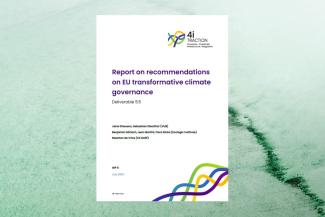
Gheuens, Jana et al. (2024): Report on recommendations for transformative EU climate governance. 4i-TRACTION Deliverable 5.5 VUB; Brussels.
Report on recommendations for transformative EU climate governance
This report offers recommendations for what transformative EU climate governance could entail, building on the insights of prior 4i-TRACTION research.
The EU transition to climate neutrality necessitates both substantive and procedural measures. Substantive measures include ambitious, farsighted emission reduction targets and the corresponding actions to achieve them. Procedural measures encompass the frameworks, instruments, and institutions that guide the decision-making process.
On the substantive side, the 4i-TRACTION project identified four policy paradigms that in the past have guided EU climate policy: (1) Green Economic Liberalism; (2) Green Industrial Policy; (3) Directed Transition; and (4) Sufficiency and Degrowth (Görlach et al., 2024). Each of these paradigms expresses a different view on the nature of the problem that climate policy is meant to address, and hence, the required solutions. Despite their at times conflicting ideas on what sufficient climate policy should look like, the 4i-TRACTION project recommends using a mix of elements from different paradigms rather than focusing only on one in a so-called “pure” policy mix. The transition to climate neutrality requires many different types of interventions for which different paradigms might be best suited for. Additionally, the paradigms can complement each other and create ideal conditions for climate governance together. As not all interventions take place at the same time, the EU should not only focus on which elements to use but also on when to use them.
Concerning procedural governance, existing EU legislation such as the Governance Regulation and the European Climate Law, has created mechanisms that shape climate-related decision-making processes. For instance, the European Climate Law has established the European Scientific Advisory Board on Climate Change that aims at providing a scientific basis for EU climate measures. Prior research has shown that while existing procedural governance mechanisms have the potential for transformative action, they often fall short due to issues with implementation, follow-up and resources (Gheuens & Moore, 2024). Based on these findings, this report formulates three broader policy recommendations for EU climate governance concerning how elements of procedural governance can help increase credibility and societal acceptance of EU climate measures:
(1) Strengthen public participation and stakeholder dialogues by giving them a timely role in the policy process, establishing clear guidance, and improving follow-up procedures;
(2) Facilitate evidence-based policymaking by formally involving scientific advisory bodies in the policy process, and streamline reporting and follow-up procedures to enhance transparency and implementation;
(3) Integrate climate and social considerations into policy planning & implementation by defining criteria for climate policy assessment and developing a shared understanding of its social dimension, facilitating better implementation follow-up.
Governing the transition
The report shows that substantive and procedural climate governance are intertwined and that the EU transition to climate neutrality should focus on both of them to be successful.
The policy paradigms rely on procedural climate governance to gain a sense of legitimacy and credibility, and to build the support needed for the measures. This means something else for the different paradigms:
- For Green Economic Liberalism, policymakers must maintain the carbon price, even if it increases, to ensure credibility;
- Establishing credibility for Green Industrial Policy involves stakeholder ownership of climate measures to secure long-term support for legislation;
- The Directed Transition paradigm emphasizes the importance of enshrining short- and long-term commitments in laws and targets, along with developing strategies and plans to achieve them;
- For Sufficiency and Degrowth, building social momentum for lifestyle changes through bottom-up decision-making processes, and adjusting communication about the transition are crucial.
Because of these different views on establishing credibility, the paradigms focus on various functions of procedural climate governance. Therefore, the proposed mix of policy paradigms should also include a mix of procedural governance mechanisms that aim to fulfil a wide range of functions such as planning and target-setting, expert advice, participation, monitoring and evaluation, and